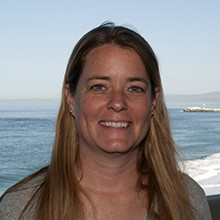
Holly continues her work with employing detection methods to uncover population fluctuations of harmful algal bloom (HAB) species in Monterey Bay, in particular members of the domoic acid producing genus Pseudo-nitzschia. Ongoing projects are aimed at uncovering species diversity between bloom events, and linking that community profile to environmental factors associated with the proliferation of toxic species. A project funded by USC SeaGrant (2018 - 2021) involves transitioning several qPCR assays for HAB species onto a field deployable handheld device. As part of a new NOAA IOOS Ocean Technology Transition award (2023-2026), EBL is adding two Aqusens cell imaging units to available tools for research and monitoring!
In fall of 2020, Holly was awarded an EPA grant along with MLML's Coastal Wetlands Group (Ross Clark, Kevin O'Connor): https://www.epa.gov/newsreleases/us-epa-awards-almost-1-million-san-jose-state-university-research-combating-harmful
Using this funding, we will demonstrate the effectiveness of farm runoff treatment systems in reducing nutrient discharges to coastal waterways and provide a blue print for scaling-up water quality treatment systems within the agricultural watersheds of the Monterey Bay. This project will also examine the potential link between agricultural nutrient discharges and the growth of off shore harmful algal blooms (HABs). This link will be examined through laboratory-based studies of physiological response to specific nutrient discharges and by observing effects from nutrient loading on blooms in Monterey Bay. This work will be carried out with collaborator Dr. Mine Berg.
Holly has been serving as co-chair of the National HAB Committee (2018-2024) which serves as a collective voice for the academic, management and stakeholder communities interested in national HAB issues. In this role, she works to continue to increase awareness of HAB issues across public and legislative entities. During fall 2018, she joined the Editorial Board of Harmful Algae as a Subject Editor, and advanced to Associate editor (2021-2023).
Holly welcomes project collaborations involving molecular detection of HAB’s or pathogens.

